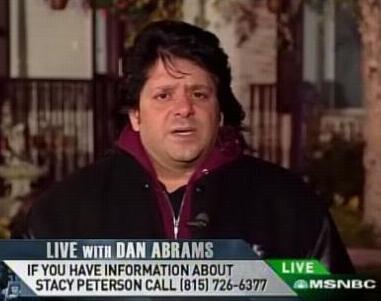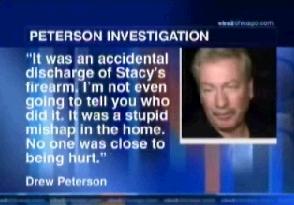 This is a rush transcript from "On the Record ," December 10, 2007. This copy may not be in its final form and may be updated.
This is a rush transcript from "On the Record ," December 10, 2007. This copy may not be in its final form and may be updated.GRETA VAN SUSTEREN, HOST: Last week, we told you about a report involving Stacy Peterson's pastor, that Stacy told him Sergeant Peterson admitted to murdering wife number three, Kathleen Savio.
Is it true? Did she say that? Well, now you will hear from the pastor himself. We sat down with Pastor Neil Schori earlier.
(BEGIN VIDEOTAPE)
VAN SUSTEREN: When was the first time you ever met or heard the name Stacy Peterson?
NEIL SCHORI, PASTOR STACY CONFIDED IN: Probably about two years ago. She was just someone who came to the church. Got to know her that way.
VAN SUSTEREN: Was she active in your church?
SCHORI: At different points, she'd be somewhat active. She was sort of a hit-and-miss kind of person, but I got to know her to a certain extent that way.
VAN SUSTEREN: How about her husband?
SCHORI: He would come less frequently, but he was also an attender.
VAN SUSTEREN: During the first year that you knew her, did you ever, you know, meet privately with her? Was it simply that she would come to church on Sunday and listen to your sermon?
SCHORI: Well, I was not the lead pastor of the church, so I didn't do too many sermons. But I - in the role that I played as a counseling pastor, I met - I met Stacy probably a year - somewhere in the first year of being at the church. So initially, I got to know her at the church, and then she reached out.
VAN SUSTEREN: I don't know if this is the right question, but in the first times that you met with her, sort of run-of-the-mill - if there is a such thing as run-of-the-mill issues a young housewife, young mother, that type of thing?
SCHORI: Sure, just like anybody's issues with life. I mean, nothing huge, nothing extremely out of the ordinary, just somebody who was dealing with life as a young mom.
VAN SUSTEREN: What was your first impression of her?
SCHORI: I thought she was very sweet. I think most people who meet her, their initial impression is that she's a very, very kind person, someone who - you don't have to be around her very much to figure out that she really loves her children. She talks about them incessantly.
VAN SUSTEREN: And your first impression of Sergeant Peterson, when you met him?
SCHORI: He was - he was nice enough. He was a little more reserved.
VAN SUSTEREN: Let's say up until, like, July or August of this year, how would you characterize the marriage? Was it a strong one, a growing one, a weak one (INAUDIBLE)? How would you describe it?
SCHORI: There were certainly issues. Some were just regular issues. Some seemed a little more - a little deeper, I could say.
VAN SUSTEREN: I know it's impossible to predict the future, but at the time when you were meeting with them, did you think that these problems were insurmountable, or you thought that they were just sort of the bumps and scrapes of a marriage?
SCHORI: You know, I try not to look at any obstacles as insurmountable related to marriage. I always believe there's hope, if people are willing to make changes, regardless of who they are.
VAN SUSTEREN: Was it a marriage, though, that was just hanging out, or did you - or were they both - did they both seem determined to work on it?
SCHORI: Well, they seemed in some ways determined to work on it. Both at them at different points would say that. But I definitely saw - I definitely saw a reason for deep concern.
VAN SUSTEREN: Did there come a time after July that Stacy called you and met with you alone?
SCHORI: Yes, she did. Yes, in August.
VAN SUSTEREN: Do you remember receiving that call?
SCHORI: I do.
VAN SUSTEREN: Were you at your church?
SCHORI: I was.
VAN SUSTEREN: What did she tell you she wanted to meet with you for?
SCHORI: I hadn't spoken with her in, oh, probably two or three months and she hadn't really been around the church recently. And she called me. It was just a regular phone call. And she just said, Hey, could we get together? I just have some stuff I'd like to talk about. And that wasn't really unusual. It was just that it had been probably several months. And I said, Sure. I said, When can you do it? And she told me, and it was - I believe it was the next day. And I actually had availability, which is unusual for me to have availability right away, but I agreed.
VAN SUSTEREN: Where did you agree to meet?
SCHORI: We met at a coffee shop in Bolingbrook.
VAN SUSTEREN: How did the conversation start?
SCHORI: I walked up and I saw her and she said, Oh, it's great to see you. And we sat down and small talk, like you would with anybody that you hadn't seen in a while. And then we talked more about the issues that she had and why she wanted to meet with me that day.
VAN SUSTEREN: And what did she describe as the reason that she needed to meet with you?
SCHORI: Again, it was some of the same relationship issues that she had concerns about, but she kept leading me to believe that there was some other reason that she had for meeting that day.
VAN SUSTEREN: Were you able to get that reason from her, or did she want to talk about it? How did that happen?
VAN SUSTEREN: Well, I try not to push people into an area that they're uncomfortable, and I gave her - I gave her an out. I said, If you'd like to share it with me, I'm here to hear it, I said, but there's no pressure. You don't have to feel like you have to share anything you're not comfortable with. So if you are - if you are comfortable, please share it. And we talked about various other things, and then she blurted out the reason.
VAN SUSTEREN: Which was?
SCHORI: She said, He did it.
VAN SUSTEREN: Just like that.
SCHORI: Just like that.
VAN SUSTEREN: Do you know what the reference point was, as that point, that, He did it?
SCHORI: I had a feeling, but I needed clarification, so of course, I followed up.
VAN SUSTEREN: How did you happen to know that that - I mean, had you spoken about the "He did it" aspect before with her?
SCHORI: I had never spoken with her about that before. I had just heard casual conversations in the community and in my own church about speculation over an interesting death of Mr. Peterson's wife, his third wife.
VAN SUSTEREN: So when she said, He did it, what did you believe that to mean?
SCHORI: I believed, unfortunately, that it was exactly what I thought, and I believed that it was related to the death of his wife. But I clarified, and I said, He did what? And she said, He killed Kathleen. And I was really blown away. I was reeling inside.
VAN SUSTEREN: So how - what did do you?
SCHORI: I asked for more specific things. She gave me details that I really can't share. But I just got her talking about it and asked her what - this is a crazy amount of information. Again, I asked her, What exactly can I do with this? Why did you tell me? I asked her if she had ever told anyone else. She said at the time, she had never told another person.
VAN SUSTEREN: What was the reason for her all of a sudden do you think or the compulsion to suddenly tell you? What was - what was eating at her, or why did she want to tell you?
SCHORI: I've wondered that for two-and-a-half months. I hope that it's because she looked at me as a safe person that she could share some very important information with. It's really speculation, at this point.
VAN SUSTEREN: How do you know that it wasn't just speculation on her part, you know, that she had information that he had - did it?
SCHORI: She had specific information.
VAN SUSTEREN: Like?
SCHORI: She had specific information about his not being in the house.
VAN SUSTEREN: The night Kathleen died?
SCHORI: Uh-huh.
VAN SUSTEREN: Did she say she'd ever confronted him about it?
SCHORI: They talked shortly after that about it.
VAN SUSTEREN: And did he admit it to her, or did she put two and two together?
SCHORI: It was more than just putting two and two together. It was not speculation on her part.
VAN SUSTEREN: Did she see something?
SCHORI: No.
VAN SUSTEREN: Was there any - besides the fact that he wasn't home that night, did - were there any other clues or signs that he wasn't just - I mean, I don't why anyone would brag about it, but I mean, that he wasn't just lying about it or trying to scare her or something?
SCHORI: Well, she shared details with me that I can't - I'm not comfortable getting into, but it was very clear. It was very clear that this was not just speculation. She was not jumping to conclusions.
VAN SUSTEREN: Why did she stay with him after that?
SCHORI: That's a really good question. My guess would be out of fear.
VAN SUSTEREN: Did she ever say she was afraid of him?
SCHORI: Yes.
VAN SUSTEREN: Did she say she was going to leave him?
SCHORI: Never - she never told me she was going to, no.
VAN SUSTEREN: Did she ever give an explanation or did Drew Peterson ever say to her why he did it?
SCHORI: Not that she told me.
VAN SUSTEREN: Did she ever talk to the police?
SCHORI: She never shared this with the police.
VAN SUSTEREN: Police ever go to her and ask her?
SCHORI: She was interviewed by the police.
VAN SUSTEREN: She didn't tell them?
SCHORI: She didn't tell them that, no.
VAN SUSTEREN: What did she tell them?
SCHORI: I don't know that for sure. I just know that she did not tell them that.
VAN SUSTEREN: Did she say why she didn't tell the police, you know, when they talked to her about Kathleen Savio's death, what she knew?
SCHORI: I believe she was simply afraid.
(END VIDEOTAPE)
VAN SUSTEREN: More from the pastor coming up. Does he think Stacy is alive?
(COMMERCIAL BREAK)
VAN SUSTEREN: Here's is more with Stacy Peterson's pastor, Neil Schori.
(BEGIN VIDEOTAPE)
VAN SUSTEREN: So what did you do? I mean, it's a rather awkward situation. You're in a coffee shop and she tells you that her husband murdered wife number three.
SCHORI: Well, I tried to control my own anxiety that I felt just hearing this information. But then I just followed up with her and said, Well, this is a lot of information you just gave me. And she said, I just had to get it off my chest.
VAN SUSTEREN: What did she expect you to do with it, do you think?
SCHORI: I think she expected me to do exactly what I did with it, and not say anything at that time.
VAN SUSTEREN: Be a sounding board?
SCHORI: I believe so.
VAN SUSTEREN: Did she have any intention of going to the police with information?
SCHORI: I don't think so. That's speculation on my part, but I don't think so.
VAN SUSTEREN: Did she have any solid information he did it? Let me back up a second. He actually confessed to her to having killed Kathleen Savio?
SCHORI: Yes.
VAN SUSTEREN: Did she tell you what words he used?
SCHORI: I'm not sure that I can give that detail.
VAN SUSTEREN: Can you give us at least some little idea? We're trying to - I'm trying to figure out whether this is, you know, the fantasy of a woman who's distressed her marriage is falling apart, or whether it's the real deal. Do you know what I mean? It's, like - you know, it's hard to sort of sort through that. You know, when people get divorced or have unhappy marriages, you know, they say - as you know, they say all sorts of things about each other.
SCHORI: Right. Sure. Sure.
VAN SUSTEREN: But was there any sort of, you know, strong clue that made you think that, This is it, this is the real deal?
SCHORI: Well, the one thing that he did say to her was, You know where I was, as if she knew. And she said, What do you mean? And he said, You know where I was.
VAN SUSTEREN: And this was how soon after the murder?
SCHORI: This was the morning after.
VAN SUSTEREN: And that was all he said.
SCHORI: All that I feel that I can share, yes.
VAN SUSTEREN: Have you spoken to Sergeant Peterson since she vanished?
SCHORI: No, I have not.
VAN SUSTEREN: How about between the time she spoke to you in August and the time that she disappeared? Did you talk to him at all?
SCHORI: I did not talk with him. He reached out to me after that meeting with her that August morning.
VAN SUSTEREN: And how did he reach out?
SCHORI: He had suggested that since I had met with Stacy - he knew that, and he said that he'd like to get together because he hadn't seen me for a while.
VAN SUSTEREN: Did you get together?
SCHORI: No.
VAN SUSTEREN: Do you think he knew she told you that?
SCHORI: That's a really good question. That's a really good question. I don't know that I can even answer that.
VAN SUSTEREN: How soon after did he call you, after you met with her in the coffee shop and she said that he...
SCHORI: There was a message on my voice-mail at the church when I got back after meeting with her.
VAN SUSTEREN: That soon?
SCHORI: That soon.
VAN SUSTEREN: And then you responded to the voice-mail.
SCHORI: Uh-huh.
VAN SUSTEREN: Did you get him or did you get the voice-mail?
SCHORI: I checked my voice-mail, and then I called him back.
VAN SUSTEREN: And you reached him?
SCHORI: I did.
VAN SUSTEREN: And the conversation went how?
SCHORI: Pretty much just like the voice-mail. He just said, Hey, I'm just trying to get a hold of you. I thought maybe we could meet since you just met with Stacy. And I - I sort of backed out of doing that.
VAN SUSTEREN: Your heart must have been in your shoes when you got that voice-mail.
SCHORI: Oh, my gosh. Sure
VAN SUSTEREN: You know, right after.
SCHORI: Sure. My mind was everywhere.
VAN SUSTEREN: Do you think she's alive?
SCHORI: I sure hope and pray that she is.
VAN SUSTEREN: What do you think?
SCHORI: I don't believe so.
VAN SUSTEREN: What makes you, as you sit there now, believe Stacy, that she was telling you the truth that Sergeant Peterson had confessed to killing Kathleen Savio?
SCHORI: Right. Because the very specific details that Stacy shared with me that morning are being backed up by the investigation that's being done and is being reported in the news.
VAN SUSTEREN: So stuff you're reading about now is...
SCHORI: Is - completely backs up what she said.
VAN SUSTEREN: Is there anything else you want to - that I haven't asked you in this interview, that you want to add to this interview?
SCHORI: I would just like to say that if there is somebody out there that has information related to Stacy, and for whatever reason, they have not come forward yet, that now is the time to do it because this is a missing mother. There are four kids that need their mom. And it's always the right thing to do right.
VAN SUSTEREN: Tough, though.
SCHORI: Tough, very tough. But it doesn't take away from the fact that it's the right thing to do.
(END VIDEOTAPE)
 RE: Hey babe..
RE: Hey babe..


 This is a rush transcript from "On the Record ," December 10, 2007. This copy may not be in its final form and may be updated.
This is a rush transcript from "On the Record ," December 10, 2007. This copy may not be in its final form and may be updated.













